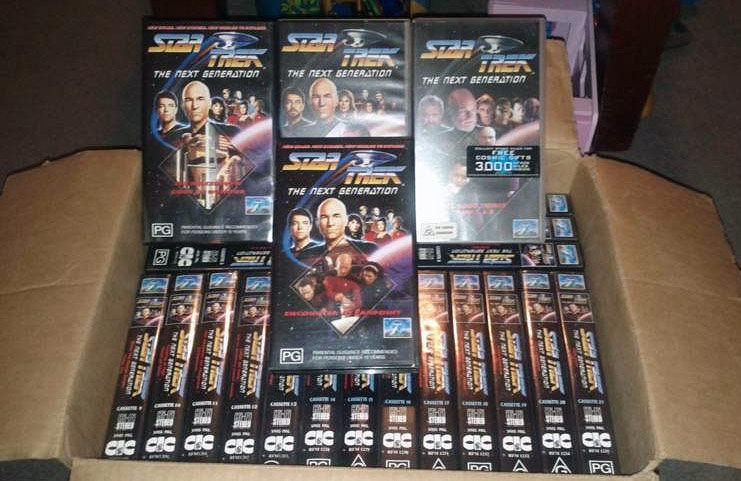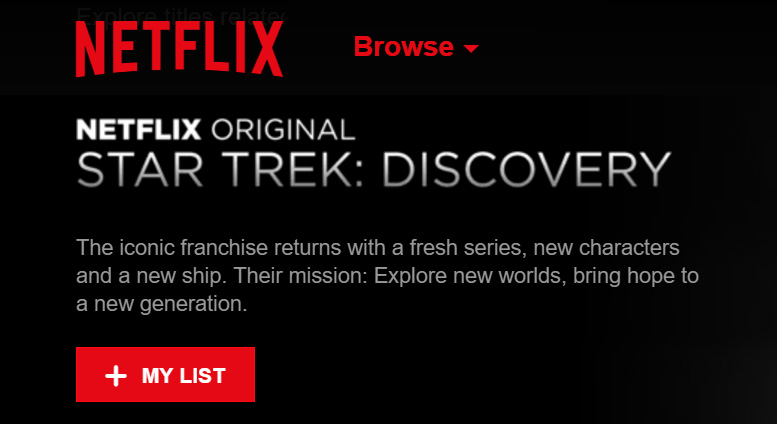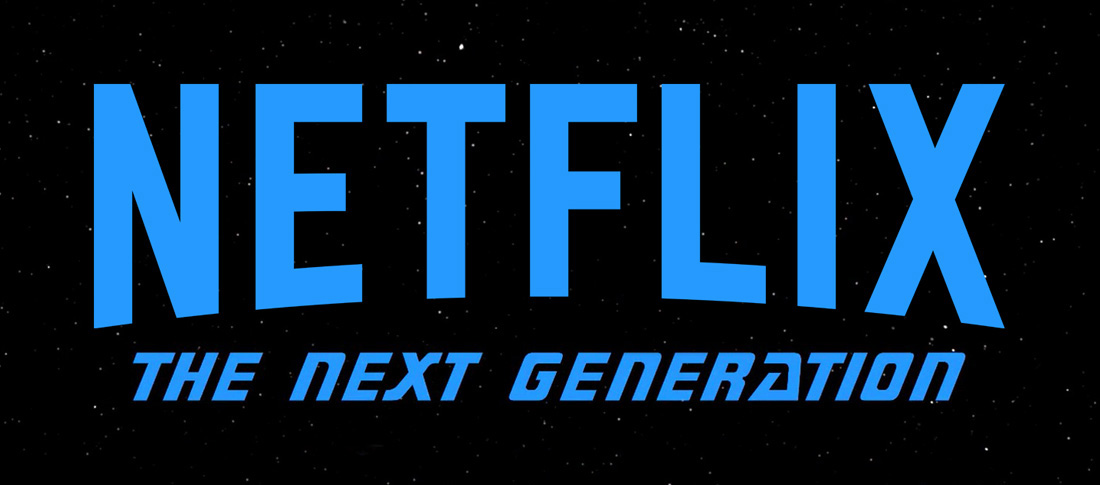Netflix securing international rights to STAR TREK: DISCOVERY was met with understandable grumbles in the US and Canada… but widespread excitement everywhere else.
In the past, watching Star Trek outside of North America could be an arduous task, due to unforgiving TV schedules and exorbitantly-expensive VHS releases. Suddenly the tables have turned and international fans have a better deal.
How did this happen – and what does it mean for DISCOVERY and CBS All Access?
International fans finally catch a break
I’ll use my country, Australia, to illustrate what a game-changer the Netflix deal is for international Trek fans.

During the Rick Berman era, watching Star Trek here was a struggle. Episodes aired late at night – years after their initial US broadcasts – and frequently ran late. If you could afford $AU 20 per tape of the two-episode VHS releases, you could buy the months-late home releases. Star Trek was either a scheduling afterthought or a lucrative revenue stream at a time when only the passionate spent money on TV shows.
Star Trek: Enterprise turned the tide a little, airing within just months of its US premiere – but the internet was then booming, and we knew more keenly that we were being left behind. Sure, US scheduling wasn’t perfect: syndication timeslots varied wildly, and UPN availability could be patchy. For most Americans, through, it was a reliable primetime fixture.
In that context, the scale of some fans’ fury at STAR TREK: DISCOVERY being confined to CBS All Access was for me – initially, at least – a little hard to sympathize with.
Longtime Americans fans have been used to free and easily accessible Star Trek – and in recent years, cheap streaming services offering a suite of high-quality original programming. Learning that they would now need to pay for new Star Trek content was naturally jarring, not to mention the uncertain technical quality of the platform.
But $5.99 a month (less than $25 USD for the thirteen-episode first season) wasn’t an outlandish ask: an iTunes standard-definition season pass would cost more. Many pay more for HBO Now just to watch Game of Thrones. In the 1990s, international fans paid vastly more for those VHS tapes I mentioned (not that we’d now wish that on anyone).

Few would prefer paying for an All Access subscription over a more generous Netflix one: of course it’s not ideal. But from my usually Trek-starved overseas perspective, it just didn’t seem too bad, especially given we don’t know what CBS’s bigger plan might be.
Yes, Star Trek is an American production, but it’s one with an international fanbase that supports it financially. The notion that we’d all have have to do our bit to support Trek’s long-awaited return to TV reflected the globalization of Hollywood distribution – and of Star Trek itself.
Then the Netflix deal turned that upside down.
US and Canada get a raw deal
International fans might have dreamed Netflix would pick up DISCOVERY after missing out on US broadcast rights, but the more likely and expected outcome was a piecemeal distribution plan by territory, to a variety of broadcast and streaming outlets. Some countries would fare better than the US, some way worse – but the idea that CBS would give nearly every other country a better deal seemed too good to be true.
But that’s precisely what happened when CBS and Netflix announced a partnership that would bring the new series to 188 countries worldwide – a number that includes neither the United States or Canada – and that new episodes of DISCOVERY will arrive on the most reliable and widely-supported streaming service on the planet, just hours after their American debut.
Those who don’t already subscribe to Netflix will also receive an array of high-quality original and catalog shows and films when they sign up, including the entire Star Trek television library.
It felt like we won the lottery.

After the euphoria subsided, the reversal of fortune became clear. American viewers are being asked to support a corporate experiment, while their overseas counterparts get the very deal that many fans the world over were clamoring for.
For US fans, the show will debut on CBS All Access, the network’s nascent streaming service offering little other content, much of it also available elsewhere. Not yet two years old, All Access has somewhat mixed user reviews, and is only available on a limited number of devices – meaning that some fans will actually need to purchase new hardware before they can watch DISCOVERY on television, as a multitude of Blu-ray players, Smart TVs, and other connected devices do not yet carry All Access apps.
Plus, each episode will contain around twelve minutes of advertisements – while certainly less ad time than traditional television broadcasts, Netflix will run STAR TREK: DISCOVERY commercial-free. CBS is still only “toying” with adding an ad-free tier, but at present it seems that viewers will get only the basic cable experience, not the brave new streaming one.
And let’s not forget Canada’s more complex arrangement, where the show will air first on ad-supported Bell Media cable channels and then some time later on their streaming service. Canadian fans may need a cable subscription to be part of the conversation.
CBS President and CEO Les Moonves is confident in making Star Trek the linchpin of a new streaming service because its fans always pursue new content – but this may be a bridge too far. When Netflix launched House of Cards, a huge subscriber base was already hooked into their vast content library.
CBS believes it doesn’t need that in order to get fans and other interested viewers to sign up to yet another service.
Is CBS hedging its bets?
This distinct possibility helps explain the Netflix deal, which provides CBS with a massive safety net. It’s so massive you have to wonder how confident they are in their new baby. Is DISCOVERY a litmus test for whether the market can accommodate a studio-specific streamer lacking a host of killer apps – and if it fails they’ll settle for third parties, knowing they at least tried?
Netflix underwrites this gamble because their license fee will recoup much of the production costs for the show – some of that 60% coverage Moonves touted back in March, and likely one of the primary reasons why Moonves recently revealed that the new show is already profitable. Netflix’s worldwide platform will also put DISCOVERY in front of many new eyeballs, deepening the Star Trek brand.
But Netflix is a behemoth, which has two implications.

First, the show is being labelled as “Netflix Original” – potentially even in the opening credits sequence – meaning most international viewers will consider it to be another Netflix show in the vein of Orange is the New Black or Marvel’s Daredevil.
With the old shows also included on the service, some will assume Star Trek now belongs to Netflix, a brand with significant consumer awareness. Any international expansion CBS may have hoped for in the future won’t be preceded by brand-building – and CBS will be a non-entity to many, many viewers of Star Trek.
Secondly, Netflix’s commitment is so comprehensive that if All Access flops, it could step in, offer CBS more money, and take over domestic distribution for future seasons of the show. Their meticulous viewing data for the old shows led to Netflix to eagerly pursue DISCOVERY, demonstrating Star Trek’s substantial continuing value. CBS needn’t fear the franchise will be marooned by a failed gamble.
What’s odd is that Netflix have secured global rights to the existing shows, including the US and Canada. It was logical to assume – and feared by some – CBS would pull the previous television episodes from Netflix, Amazon, and Hulu to increase All Access’s value proposition. If Trek fans wanted to stream any of the TV episodes, they’d need CBS All Access.
Luckily this did not come to pass, but this now means that fans less incentive to keep subscribing once the first season of DISCOVERY concludes; it seems certain that a number of viewers will “binge and bail” on the streaming service, spending the smallest amount of money possible to watch the new show.
Was this an unfortunate side effect of the security the Netflix deal provided? Netflix likely insisted on obtaining rights to the full Trek back catalog in all countries, as part of their push to secure global rights to all third-party content going forward.
They may also be playing a long game, putting the pieces in place to become the global home of Star Trek. For the contractual convenience and license fee Netflix offered for DISCOVERY, CBS may have been elbowed into renewing and expanding their competitor’s catalog Trek deal.
By surrendering a calling card, All Access may now be more fragile.
Now we watch – and wait
It increasingly appears American viewers are being asked to help CBS test the waters – but while they’re smart enough to take advantage of the new global distribution paradigm, CBS may be underestimating how connected international Star Trek fandom has become.
Plenty of North American fans will learn about the better deal enjoyed nearly everywhere else on Earth. At least it may mean they can look forward to a better deal for later seasons if All Access flops.
That’s not much consolation in the meantime, but CBS has at least proven they understand and care about Star Trek, financing a loving high-definition restoration of The Next Generation and hiring an probably the most ideal showrunner for DISCOVERY – after all, the franchise could surely be in far worse hands.
If I lived in the US, I’d give CBS a chance and subscribe to All Access in January… but I would certainly join fans in speaking out if the service doesn’t deliver. CBS must recognize that even Star Trek fans have their limits – and they’d be wise to ensure All Access is utterly reliable and feature-rich if they want to escape Netflix’s shadow.
Jack Reed writes about film and TV while blogging at Remote Wanderings.
A lifelong Star Trek fan, he suffers from DS9 VHS Retention Disorder.


